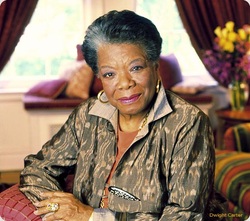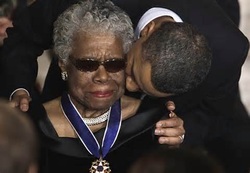
Her death was confirmed in a statement issued by Wake Forest University in Winston-Salem, North Carolina, where she had served as a professor of American Studies since 1982.
Tall and regal, with a deep, majestic voice, Angelou defied all probability and category, becoming one of the first black women to enjoy mainstream success as an author and thriving in virtually every artistic medium. The young single mother who performed at strip clubs to earn a living later wrote and recited the most popular presidential inaugural poem in history. The childhood victim of rape wrote a million-selling memoir, befriended Malcolm X, Nelson Mandela and the Rev. Martin Luther King, Jr., and performed on stages around the world.

She was a mentor to Oprah Winfrey, whom she befriended when Winfrey was still a local television reporter, and often appeared on her friend's talk show program. She mastered several languages and published not just poetry, but advice books, cookbooks and children's stories. She wrote music, plays and screenplays, received an Emmy nomination for her acting in "Roots," and never lost her passion for dance, the art she considered closest to poetry.
"The line of the dancer: If you watch (Mikhail) Baryshnikov and you see that line, that's what the poet tries for. The poet tries for the line, the balance," she told The Associated Press in 2008, shortly before her birthday.
Her very name as an adult was a reinvention. Angelou was born Marguerite Johnson in St. Louis and raised in Stamps, Arkansas, and San Francisco, moving back and forth between her parents and her grandmother. She was smart and fresh to the point of danger, packed off by her family to California after sassing a white store clerk in Arkansas. Other times, she didn't speak at all: At age 7, she was raped by her mother's boyfriend and didn't speak for years. She learned by reading, and listening.
"I loved the poetry that was sung in the black church: 'Go down Moses, way down in Egypt's land,'" she told the AP. "It just seemed to me the most wonderful way of talking. And 'Deep River.' Ooh! Even now it can catch me. And then I started reading, really reading, at about 7 1/2, because a woman in my town took me to the library, a black school library. ... And I read every book, even if I didn't understand it."
At age 9, she was writing poetry. By 17, she was a single mother. In her early 20s, she danced at a strip joint, ran a brothel, was married (to Enistasious Tosh Angelos, her first of three husbands) and then divorced. By her mid-20s, she was performing at the Purple Onion in San Francisco, where she shared billing with another future star, Phyllis Diller. She spent a few days with Billie Holiday, who was kind enough to sing a lullaby to Angelou's son Guy, surly enough to heckle her off the stage and astute enough to tell her: "You're going to be famous. But it won't be for singing."
After renaming herself Maya Angelou for the stage ("Maya" was a childhood nickname), she toured in "Porgy and Bess" and Jean Genet's "The Blacks" and danced with Alvin Ailey. She worked as a coordinator for the civil rights group Southern Christian Leadership Council, and lived for years in Egypt and Ghana, where she met Malcolm X and remained close to him until his assassination, in 1965. Three years later, she was helping King organize the Poor People's March in Memphis, Tennessee, where the civil rights leader was slain on Angelou's 40th birthday.
"Every year, on that day, Coretta and I would send each other flowers," Angelou said of King's widow, Coretta Scott King, who died in 2006.
Angelou was little known outside the theatrical community until "I Know Why the Caged Bird Sings," which might not have happened if James Baldwin hadn't persuaded Angelou, still grieving over King's death, to attend a party at Jules Feiffer's house. Feiffer was so taken by Angelou that he mentioned her to Random House editor Bob Loomis, who persuaded her to write a book.
Angelou's memoir was occasionally attacked, for seemingly opposite reasons. In a 1999 essay in Harper's, author Francine Prose criticized "Caged Bird" as "manipulative" melodrama. Meanwhile, Angelou's passages about her rape and teen pregnancy have made it a perennial on the American Library Association's list of works that draw complaints from parents and educators.
"'I thought that it was a mild book. There's no profanity," Angelou told the AP. "It speaks about surviving, and it really doesn't make ogres of many people. I was shocked to find there were people who really wanted it banned, and I still believe people who are against the book have never read the book."
Angelou appeared on several TV programs, notably the groundbreaking 1977 miniseries "Roots." She was nominated for a Tony Award in 1973 for her appearance in the play "Look Away." She directed the film "Down in the Delta," about a drug-wrecked woman who returns to the home of her ancestors in the Mississippi Delta. She won three Grammys for her spoken-word albums and in 2013 received an honorary National Book Award for her contributions to the literary community.

 RSS Feed
RSS Feed
